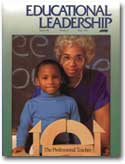How much will a professor who taught for a few years in the late '50s know about the realities of elementary and secondary classrooms in the '90s?
Not much, you might answer, but one of the best-kept secrets in education is the fact that the typical education professor has fewer than five years of experience in the “real world” of K–12 education. For most, that experience occurred more than two decades ago. Even more frightening is the revelation that 30 percent of those who made up the education professoriat in the 1980s had no previous field experience (Ducharme and Agne 1983).
Would a medical school permit someone who hadn't worked in a medical facility for three decades to teach? Certainly not. Students in business or law wouldn't tolerate it either, yet generations of prospective teachers have been carried along in the deception.
It is a generally accepted premise in our society that anyone can teach, even without professional training. One recent study showed that as many as one-third of education majors believed they could begin teaching immediately without any coursework or experience in education (Book et al. 1985). Such assumptions have been bolstered by state legislatures scrambling to certify emergency teachers simply because they possess a degree in a “related” field.
Most children spend 180 days each year in the company of teachers—more than 14,000 hours between kindergarten and high school graduation. A few eventually choose a career in teaching, and as undergraduate education majors they look back upon their K–12 years as the true internship for prospective teachers. In fact, research suggests that most of them consider their public school years to be more important than preservice coursework as a source of knowledge about the professional realities of a career in teaching.
Students consistently indicate that education professors offer limited information about teachers' professional problems. A survey of nearly 500 Michigan State University students enrolled in an introductory education course suggested that education coursework offered limited knowledge about the day-to-day life of a teacher (Book et al. 1983). Students looked forward to full-time teaching and predicted that educational foundations courses would contribute even less to their professional preparation than their own experiences as K–12 students.
In another study (Ciscell 1989), 227 junior-level education majors in three universities were asked to rank several possible sources of information about the realities of teaching. Respondents rated “student teaching/field experiences” as their most important source of preservice knowledge about the teaching profession. More importantly, these education majors ranked “first-hand observations of former K–12 teachers” as more important than preservice “methods courses.” When asked if they felt ready to teach, nearly 70 percent of these junior-level respondents indicated that they were ready to start full-time teaching careers immediately.
The education reform movement has managed to focus some attention on the process of teacher preparation, but few concerns have been expressed about teacher educators themselves. Perhaps it's time to look more closely at who has been teaching America's teachers.
Clearly, restructuring teacher preparation to include a “cutting edge” professoriat—and move away from an emphasis on scholarly productivity—would be a formidable task. Yet the character of teacher education may be altered in this decade not by legislative mandates or creative preservice requirements but by the massive faculty retirements due before the end of the century. Intelligent recruitment of candidates with broad experience in contemporary elementary and secondary schools could be a logical response to the education reform movement and the basis for rebuilding trust among preservice teachers.
